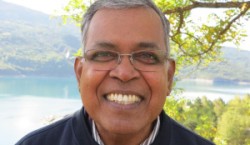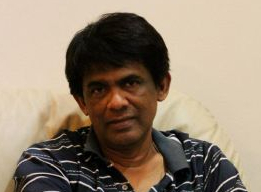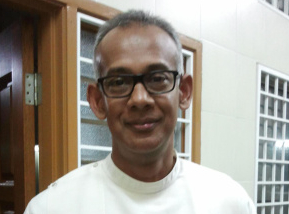With the dissolution of parliament on April 10, 2013, Malaysia’s 13th General Elections is on the roll. Malaysians of all faiths will be polling on May 5, 2013.
Christians make up 10% of the total population are eager to vote having faced with issues like the usage of the word ‘Allah’ and Ibrahim Ali’s cantankerous ‘Bible-burning’ call this year.
Citizen Journalist Malaysia (CJMY) approached a few Christians to find out their views on the forth-coming election.
Catholic priest and director of the Catholic Research Centre (CRC) Fr Clarence Devadass (pic above) from Kuala Lumpur, in collaboration with the Council Churches of Malaysia had produced a video ‘Responsible Stewardship and General Election’, as a guide for Christians in their voting decision.
According to Fr Clarence during the March 8, 2008 elections, he was asked if it is a sin for a person to not vote.
Referring to the Catechism of the Catholic Church (CCC), he said that the document uses the word ‘morally obligatory’ with regards to the duty to vote.
“A moral obligation is generally defined as an obligation arising out of consideration of right and wrong,” he said.
“In other words, a Catholic after having given due consideration of the common good of society, has the duty to vote for a candidate he or she considers will promote respecting fundamental human rights and dispense justice by respecting the rights of everyone.
“In the Catholic tradition, responsible citizenship is a virtue, and participation in political life is a moral obligation.
“This obligation is rooted in our baptismal commitment to follow Jesus Christ and to bear Christian witness in all we do.
“Therefore, I call on all Catholics, to not forget to exercise your Catholic duty to vote at the coming general election. It is your moral obligation,” he said.
Fr Joseph Stephen

Another Catholic priest, Fr Joseph Stephen voiced his view that he would like to see a free and fair election.
“I want to study the policies put forward by the different parties and see whether they are good for all races and all strata of society.
“I want corruption to be wiped out maybe not immediately but certainly as part of the drive the party I will vote for.
“I am encouraging more turnout by the voters at 99% as this will offset the new voters with new identification cards and the new immigrants who have obtained citizenship.
“Thus, I am encouraging those in our parish community, to bring the elderly to vote, teach them how to vote and to be aware of how not to spoil the votes,” he said.
Philip Yeoh
Training and business process consultant Philip Yeoh, 53, need not be urged to vote, because since last year, he was eagerly waiting for polling day.
He gave a long list of reasons as to why he wanted to vote, for example to give Malaysia a better chance of stemming the bleeding of public finances and downward spiral in our standards of living.
“I shall vote to protect our land and people from biased policies, practices and businesses that threaten our ecological safety and integrity.
“I shall vote for change,” he stressed.
Caroline Soosai

Recruitment Process Outsourcing regional director Caroline Soosai, 39, hopes that there will be equal opportunities for all candidates to reach out to the public, during the elections.
“I am a first-time voter. For the last 3 elections, I was not able to travel back to my hometown.
“I would be voting this time as I look forward to change.
“I am just sick and tired of the constant abuse of our hard earned tax-payers’ money, with no sense of responsibility.
I worry about the future of my children in this beloved country due to the substandard education system.
“Therefore, a change is needed,” she said in explaining her concerns which will affect her voting decision.
Marcel Fernandez

Marcel Fernandez, 62, a dentist in private practice longs for the Malaysia of the sixties where the people never thought of themselves as Malays, Chinese, Indians.
“We were just Malaysians then. We used to work together and play together as one people not even aware that we were of different races.
“One of the greatest evils perpetrated by the Barisan Nasional especially, UMNO leaders, was to pit one race against another for their own benefit.
“We had leaders like Tunku who though not perfect really had the interests of the people at heart unlike our present bunch.
“In the coming election, I hope that the people will give PR a chance to show how they can perform.
“I expect our rulers to be honest and transparent in governing the country and uniting the races into one united Malaysian nation.”
George Quake

George Quake, in his 60s, residing in Johor is expecting an ‘Ubah’ government for the coming election.
“Pakatan Rakyat has done so much in educating the people of the political scenario today. I congratulate them.
”I have been voting for the opposition even before the great Tsunami in 2008.
“My belief is that there must be a strong opposition for a healthy government.
“This time around, a change in government is what I look for. This will save the country from bankruptcy.”
Miri Voter
A 30 years old lady from Miri, Sarawak, who would like to be remain anonymous, is very skeptical that that there will be an ‘Ubah’ in the government.
“To be honest, I don’t have great expectations. I am still expecting BN to win in Sarawak.
“To me, personal integrity is important in selecting a candidate to vote.
“Also, willingness to serve with passion and perseverance.
“I think personal integrity is more important than the party ideals.
“I look at the person, and not the party.”
Dennis Prem Kuman Chandran

Senior Manager in the Electronics Industry Dennis, 38, is presently on assignment in Korea.
Denis’s expectation for the coming election will be clean and fair.
“Since I will be voting through postal votes from overseas, I hope all postal votes will not be subject to any fraudulence.
“The factors for me to decide who to vote will depends firstly on integrity of the candidate and the party he represents. If this acid test fails, then there is no point voting for that candidate.
“When facing difficult situations or temptations, it is the integrity of that candidate that will decide if he put his personal gains or political agenda ahead of his constituency or the country in general.
“Secondly, will the accountability of the candidate based on his tracks record. Is the candidate someone who has the maturity to accept criticism of any shortcoming, takes the accountability and fixes the issue? Or does he sits down point fingers at others without taking any positive course of action?
“Thirdly, competency of the candidate; I rank this third because competency needs time to develop but as long as the candidate is willing to learn and re-learn especially from failures and short-comings, he will high likely be on the right track,” he said.
Shirlene Carol Fernz

Shirlene, 35, who is from Labuan but presently is a legal council in Singapore, feels that Malaysia needs a change of government.
“Voting is key towards a better future for our beloved nation.
“Without casting your vote, you can’t change the government of the day.
“When parties are in power for too long, governance becomes routined and predictable.
“I cannot bear to imagine racism, biasness and favoritism carrying on for the next 50 years or so.
“I want partiality for all Malaysians, regardless of background, skin colour, race, religion and status.
“It is my duty to vote to ensure that I participate in what is to be the faith of our nation and the future of my future children and my future grandchildren.
“May 5th 2013 will be the day when we Malaysians will head out to the polls to save our beloved Malaysia,” she said with gumption.
Prashanth Martin
Prashanth Martin, in his 20s and from Penang, believes in a 2-party system.
“Good governance begins with the establishment of a 2-party system.
“A 2-party system would ensure adequate check and balance.
“A 2-party system would begin to advocate the development of the people rather than the leaders’ coffers, and it would eliminate excess (not entirely but significant amount) from the system and process and use the access gain to invest in the rakyat.
“The success of a government is not so much the number of seats it garners, or the grandeur and ambitious (and sometimes lofty and too idealistic) goals that it pompously depicts in its manifestos, but rather the development and the well-being of its people,” said the young voter.












